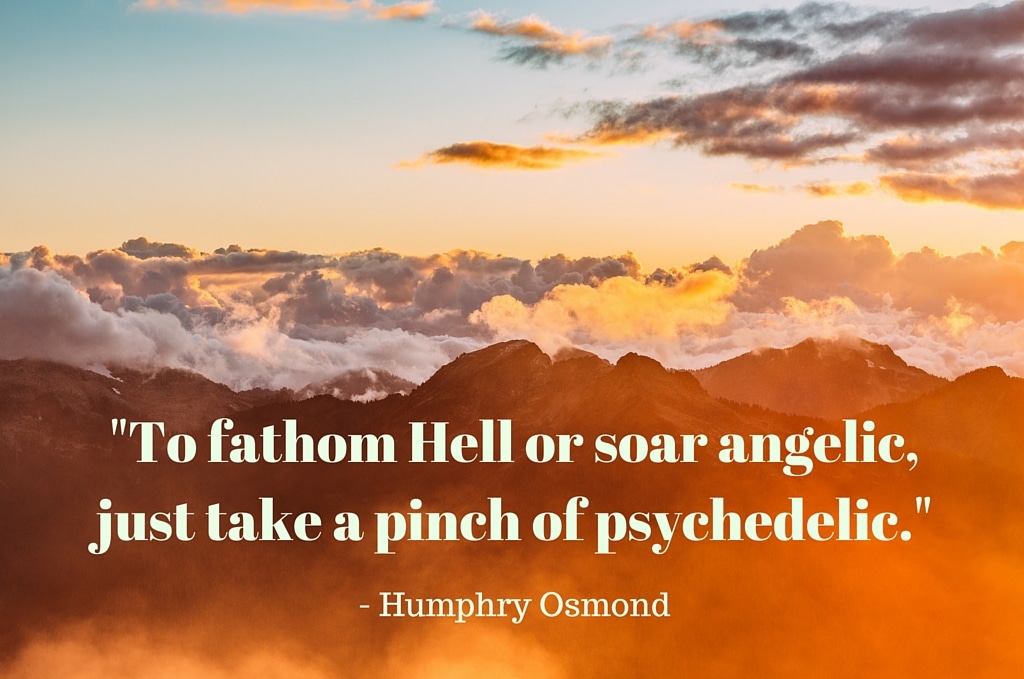
Successfully navigating a psychedelic experience requires a healthy set and setting, according to Timothy Leary in his 1964 manual The Psychedelic Experience. | Flickr CC user Ryan Ready
When I recently had the opportunity to talk with a psychedelic integration specialist, we discussed all kinds of topics—addiction, anxiety, mindfulness, and, of course, psychedelic experiences. With several years under his belt as a recovery coach and integration specialist for Being True to You, John Bodine has talked to many people about their psychedelic journeys, helping them tease meaning out of the obscure and relate visions, thoughts, and feelings that come up during experiences to their day-to-day lives.
So I didn’t want to miss my chance to ask John for his expertise on what he thought were the keys to having a good psychedelic experience. To clarify, an integration specialist can’t condone psychedelic use or recommend particular psychedelics, but for people who independently choose to undergo a psychedelic experience on their own, an integration specialist, much like a sitter for MAPS’ harm reduction project Zendo, can share expertise for how to have a safe experience and maximize the benefits of psychedelics. John shared four key principles to make the most of your psychedelic experience. But, before delving into these principles, it’s helpful to understand the fundamental psychedelic concept of “set and setting,” and, in particular, what “set” has to do with the healthy mental attitude that’s imperative for having a successful psychedelic experience.
What is Set?
In his 1964 guide for taking psychedelics The Psychedelic Experience: A Manual Based on the Tibetan Book of the Dead, Timothy Leary first introduced his idea of “set and setting.” Although research has shown that psychedelics are not physically addictive and don’t harm mental health, they absolutely can come with some risks; to mitigate those risks and maximize benefits, Leary suggested that the most important key is set and setting.
Setting is pretty straight-forward. It’s the physical environment where you undergo your experience, whether it’s in your bedroom, in a ceremony with a shaman, or at a music festival. Setting includes music, light, pillows, candles, or anything that is physically in your space with you as embark on your journey.
Set, on the other hand, is a little more nuanced and has to do with your personality and mental state going into the experience. Leary divided set into two subcategories—long-range and immediate. While long-range set has to do with the established characteristics of “the kind of person you are—your fears, desires, conflicts, guilts, secret passions,” immediate set encompasses the attitude you have going into the experience.
“Immediate set refers to the expectations about the session itself,” Leary wrote in his psychedelic manual. “Session preparation is of critical importance in determining how the experience unfolds. People tend naturally to impose their personal and social game perspectives on any new situation. Careful thought should precede the session to prevent narrow sets being imposed.”
4 Principles for a Beneficial Experience
The principles John shared with me supplement Leary’s original ideas of immediate set, and they provide a helpful breakdown of how to embark on a psychedelic experience with a positive attitude. These are particularly useful for anyone who finds themselves in a challenging moment, but, overall, they share solid expertise for anyone taking a psychedelic.
Grounding
Grounding yourself is essentially focusing your attention and feeling yourself connected to your body, the earth, and your physical surroundings. You can do this anywhere, but studies suggest that grounding yourself outside, also called “earthing,” actually provides health benefits that help you to relax, reduce pain, and sleep better.
The first step to grounding is pretty easy. “Feel your feet on the ground,” John suggested. Taking deep, measured breaths is also helpful for grounding, as is actually laying on the ground, particularly outside, and connecting all parts of your body to the earth.
Grounding yourself is particularly helpful if you find yourself floating away into a scary or anxious mental space, but even if you’re not, rooting yourself to the earth can be a powerful spiritual experience. As John put it, “To jump into flight, you have to first root into the ground.”
Surrender
“The deepest lessons come with surrender,” John said. “Relax into it, breathe into it, and ask, ‘Can I let that go?’”
This echoes what Timothy Leary famously suggested in The Psychedelic Experience—“whenever in doubt, turn off your mind, relax, float downstream.” This is particularly important for someone new to psychedelics, Leary explained. By not attaching yourself to expectations—whether physical, intellectual, or spiritual—you can explore the depths of your experience without preconception and then make sense of it later. (However, while you don’t want to get too wrapped up in analysis, it can be helpful to jot down any revelations that come to you, which I’ll revisit below.)
The principle of surrender can also apply to the physical. MAPS’ manual for how to work with challenging psychedelic experiences suggests that you allow “energy [to] move and express itself in whatever form.” The manual, which gives advice to those acting as caretakers for someone in a psychedelic experience, says that energy can take many forms, including “uncontrolled shaking, yoga postures, dancing, or ritualistic type of movements.” As long as the person isn’t in a position to harm themselves or another person, surrendering to physical expression is healthy and normal.
Curiousity
A lot of people liken a psychedelic experience to feeling like a child again and experiencing a sense of wonder and awe at the world around them. John suggested to “be curious about images, thought patterns, and physical sensations, and to ask yourself, ‘What is the lesson? What is the teaching behind that?’”
That advice might sound counterintuitive to the principle of surrender, but, for a lot people, surrender and curiosity go hand in hand. Rather than fighting your discomforts, keenly observe them and take note of them, not unlike what you would do in a meditation in which you are mindful of your thoughts. Be curious about what you experience, but, once you’ve named it, let it go. Write down anything remarkable and then move on.
Intention
An intention is an aim or goal you want to center your experience around. Similar to grounding, it can provide an anchor to return to if you find yourself venturing into frightening territory. An intention can be something serious—like to understand the nature of an addiction that’s interfering with your life—or it could simply be play, fun, or joy.
The intention can also take the form of a question. John shared that it is helpful to ask as specific a question as you can—rather than, “What’s wrong with me?” instead ask, “Why do I push love away?” or,“Why do I feel triggered by fear of the unknown?” or, “What would I be like if I wasn’t triggered? How would this serve me? How would I be a better person if x, y, z?”
If your intention does take the form of a question, it’s important to write down any answers you come across. You don’t have to analyze your thoughts in depth. Simply write down the main ideas, and you can revisit them after the experience is over. Simply having a notebook handy proves invaluable in helping you remember revelations in the days following the experience.
Reaping the Benefits
Once the experience is over, you can look back at your notes and tap your memory to identify what the strongest points of the experience were, John says. This is the point where an integration specialist can be helpful in making sense of any visions, thoughts, or feelings that stood out to you. By examining these peak moments, you can learn how to bring these realizations into your day-to-day life. But even once those initial revelations are processed, most experts agree that a continued integration practice is integral to long-lasting benefit.
Keeping in mind these four principles, the tenets of a healthy mindset, and the importance of integration, you can reap the most of what will always be a unique experience. A psychedelic experience can provide deep insights into yourself as an individual and how you interact with your world, but undertaking one in a way that reduces harm and enhances the benefits requires courage, an open mind, and a good attitude.









